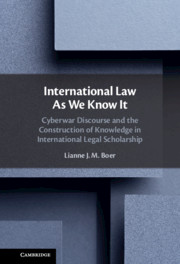 International Law As We Know It
International Law As We Know It Book contents
- International Law As We Know It
- International Law As We Know It
- Copyright page
- Contents
- Acknowledgments
- 1 Knowing International Law
- 2 “Legal Problem-Solution” and the Cyberwar Discourse
- 3 “Not ‘Armed Force’ in the Literal Sense”
- 4 “The Greater Part of Jurisconsults”
- 5 “Call Me Again If You’re Ever Ready to Begin Answering the Questions”
- 6 In Conclusion: International Law As We Know It
- Appendix Chapter 5
- Bibliography
- Index
3 - “Not ‘Armed Force’ in the Literal Sense”
Published online by Cambridge University Press: 01 October 2021
- International Law As We Know It
- International Law As We Know It
- Copyright page
- Contents
- Acknowledgments
- 1 Knowing International Law
- 2 “Legal Problem-Solution” and the Cyberwar Discourse
- 3 “Not ‘Armed Force’ in the Literal Sense”
- 4 “The Greater Part of Jurisconsults”
- 5 “Call Me Again If You’re Ever Ready to Begin Answering the Questions”
- 6 In Conclusion: International Law As We Know It
- Appendix Chapter 5
- Bibliography
- Index
Summary
This chapter asks how scholars reconstruct the meaning of the prohibition on the use of force in light of the “novel features” (Benatar) of cyberwar. Given the range of effects cyberattacks can have the question is where scholars draw the boundary of force. By creating a dialogue between different pieces and juxtaposing the arguments scholars make, this chapter shows what legal knowledge construction at the boundaries of Article 2(4) looks like. Specifically, it identifies two argumentative turns scholars take. The first pertains explicitly to the boundaries of the norm, and the chapter shows the subsequent trajectory of an argument about the (in)sufficiency of Article 2(4) in regulating these kinds of cyberattacks. The second turn pertains to the classification of the threat. Whereas to some scholars cyberattacks simply constitute a new means to wage war, to others the change is much more fundamental. Whether a scholar opts for the first label or the second, matters to how the legal analysis proceeds towards, again, a diagnosis about the (in)sufficiency of the norm. In sum, this chapter shows how exactly legal writing constructs legal knowledge in relation to Article 2(4).
- Type
- Chapter
- Information
- International Law As We Know ItCyberwar Discourse and the Construction of Knowledge in International Legal Scholarship, pp. 63 - 96Publisher: Cambridge University PressPrint publication year: 2021


